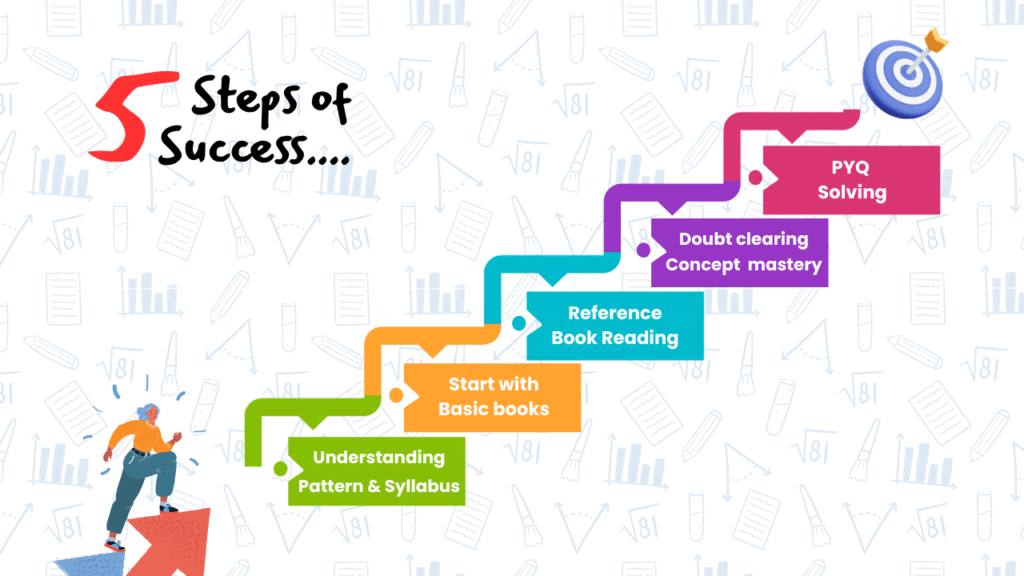
Before starting preparation, it is crucial to understand the structure of the UPSC exam which has three stages: Prelims, Mains and Interview.
Each stage tests different skills:
- Prelims focuses on objective type question (MCQs) for screening.
- Main tests analytical writing and in-depth knowledge.
- interview revaluates personality, clarity and decision making
Equally important is moving The detailed syllabus . It helps you to stay focused, avoid a relevant study and align your preparation with UPSC’s expectation.
Study passed a papers to understand question trends and depth.
Begin your journey with Class 6–12 NCERTs, especially for History, Geography, Polity, Economy, Science, and Environment.
UPSC often asks direct or conceptual questions from NCERTs, making them a must-read.
Build conceptual clarity before moving to advanced books.
Refer to NIOS for additional clarity, especially in Environment, Art & Culture, and Science.
Once your fundamentals are clear, move to standard reference books to deepen your understanding, align with UPSC’s analytical demands, and enrich your Mains answers.
Subject-Wise Standard Reference Books
Polity
- Indian Polity – M. Laxmikanth
- Governance in India – Laxmikanth (for GS-2)
History
- Modern India – Spectrum by Rajiv Ahir
- Ancient & Medieval India – Tamil Nadu State Board Class 11–12 Books
- Art & Culture – Nitin Singhania
Geography
- Certificate Physical & Human Geography – G.C. Leong
- School Atlas – Oxford or Orient BlackSwan
- Selected chapters from Majid Husain’s books (for optional or advanced GS prep)
Economy
- Indian Economy – Nitin Singhania or Ramesh Singh
- Economic Survey and Budget Summary – Official sources (for advanced understanding)
Environment & Ecology
- Environment – Shankar IAS Book
- Complement with current affairs and PIB releases
Science & Technology
- No single book needed
- Read science sections of The Hindu, PIB, and other current affairs.
Current Affairs
- Daily newspaper: The Hindu or Indian Express
- Monthly magazines: Vision IAS / Insights IAS / ForumIAS
Ethics (GS Paper 4)
- Use examples from real life, current affairs, and government schemes.
- Lexicon for Ethics
- Subbarao or G Subba Rao & P.N. Roy Chowdhury (for detailed reading)
In competitive exams like UPSC/MPSC, success isn’t just about reading more — it’s about understanding deeply.
- Answer writing, MCQs, and interview responses all demand conceptual clarity.
- Uncleared doubts create confusion in the exam hall.
- Strong concepts help tackle both direct and analytical questions.
- When your basics are clear, advanced topics become easier to grasp.
- Understanding > Memorizing – Clear concepts stay longer and help in writing better
Solving Previous Year Questions (PYQs) is one of the most effective tools for smart preparation. Here’s why every serious aspirant must make it a habit:
Understand the Exam Pattern
- PYQs reveal how UPSC/MPSC frames questions, helping you align your preparation.
Know the Demand of the Question
- Helps you learn how to decode keywords like analyze, discuss, critically examine, etc.
Identify Important Topics
- Repeated themes indicate high-probability areas — focus more on them.
Improve Answer Writing & MCQ Accuracy
- Practicing Mains PYQs improves structuring and clarity, while Prelims PYQs sharpen your elimination skills.
Self-Assessment & Progress Check
- PYQs act as a mirror to your preparation. You’ll know what’s working and what needs more attention.